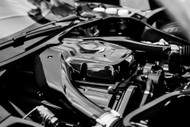Do You Know the Signs of Clogged Fuel Injectors?
1st Jan 2018

Nearly all modern-day cars and trucks use a fuel injection system to supply fuel to the engine's cylinders. The fuel injectors force fuel from the gas tank into the cylinders, allowing it to create combustion when mixed with air and spark.
But like all automotive parts, it's not uncommon for fuel injectors to fail. The most common type of failure is restricted fuel flow. Known as clogged fuel injectors, this typically occurs as a result of impurities in the gasoline. Over time, mineral deposits and other impurities accumulate inside the injectors, restricting the flow of fuel. So, how do you know if your vehicle's fuel injectors are clogged?
Signs of Clogged Fuel Injectors
Common symptoms of clogged fuel injectors include the following:
- Rough idling
- Temperature variations between exhaust manifolds (manifold with clogged fuel injector is cooler)
- Engine misfire
- Check engine light and/or failed emissions
- Smoke coming from tailpipe
- Car won't start on first key turn
- Increased fuel consumption
How to Clean and Unclog Fuel Injectors
If you believe your vehicle is suffering from clogged fuel injectors, you should consider cleaning them. Thankfully, this doesn't require direct access to the injectors (often difficult to reach). There are dozens of products designed specifically for cleaning and unclogged fuel injectors.
To use these products, you simply pour a liquid into your vehicle's gas tank. Your vehicle's fuel pump will then pump the product, along with the actual fuel, to the fuel injectors. From here, it will clean away any stubborn deposits or impurities; thus, allowing your vehicle to run smoothly once again. For maximum effectiveness, it's recommended that you use a fuel injector cleaning product every few months. This way, your injectors will remain clean and perform optimally.
Keep in mind, however, that some low-quality fuel injector cleaning products may damage your vehicle's catalytic converter. If the product contains harsh chemicals, they'll make their way to your vehicle catalytic converter after being burned, potentially damaging this critical emissions/exhaust component. Therefore, you must choose a reputable, high-quality fuel injector cleaning product.
As you can see, cleaning and unclogged fuel injectors is a relatively easy process. You pour the product into your vehicle's gas tank, and it does the rest. The only time when you'll actually need to replace your fuel injectors is when they are corroded or otherwise damaged to the point where fuel additive products are ineffective. For all other cases, you can use a liquid product that's added to your vehicle's fuel tank.

